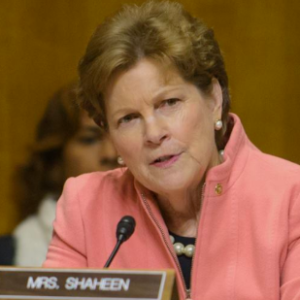NBC’s Chuck Todd has a less-than-enthusiastic take on the Democrats’ scheduled vote on the “Woman’s Health Protection Act (WHPA)” Wednesday.
“Senate Democrats are headed for a show vote on abortion that risks dividing their party, depressing their base, and looks all but certain to be defeated,” he said.
The new version of the bill is almost certain to suffer the same fate in the U.S. Senate as the version Sens. Maggie Hassan and Jeanne Shaheen sponsored last fall: Failure on the floor.
Senate Majority Leader Chuck Schumer (D-N.Y.) says he is going to call on his fellow senators to use the Reid Rule and kill the legislative filibuster to pass the WHPA with just 50 votes. But there are not 50 votes to end the filibuster. And even if there were, there are not 50 votes to pass this bill.
But just as they did last September, Hassan and Shaheen will vote for it again. Both bills would override state laws and create a federal right to an abortion at any point during the pregnancy — a position rejected by 70 percent (or more) of Americans, according to multiple polls.
But the new WHPA does differ from the old one in some interesting ways.
First, it is shorter — just 13 pages compared to the original 26 pages. The pages that have been lost insisted supporting abortion is necessary to oppose “white supremacy, and anti-Black racism;” and extending “Reproductive Justice” [sic] to “all people, regardless of actual or perceived race, color, national origin, immigration status, sex (including gender identity, sex stereotyping, or sexual orientation).”
The original Hassan-Shaheen version also declared the WHPA is “intended to protect” the abortion rights of “transgender men and non-binary individuals.”
All four members of the New Hampshire congressional delegation have already voted for this bill, and they are expected to support the updated version — though it does not refer to white supremacy or pregnant transgender men.
As Byron York at the Washington Examiner notes, the new version of the abortion law coming to the floor Wednesday does not use the word “woman” a single time, other than in the title.
Other elements remain the same, most notably the mandate that abortion be legal at any point during the full nine months of pregnancy. All that is required is for a health provider to sign off. About 12,000 late-term abortions are performed each year in the U.S., according to the pro-abortion-rights Guttmacher Institute — a number equivalent to the population of Londonderry, N.H.
And while earlier versions of the WHPA left parental notification laws in place, the new versions do not, declaring “access to abortion services has been obstructed [by] parental involvement laws (notification and consent.)”
This has long been Hassan’s position. In 2007, then-state Sen. Hassan voted with a majority of Democrats in Concord to overturn New Hampshire’s parental notification law and allow teen girls to get abortions without their parents’ knowledge.
The new WHPA also removes protections for healthcare workers currently found in the Religious Freedom Restoration Act. Devout Catholics, Muslims, and others who work in healthcare could find themselves forced to participate in abortion procedures or lose their jobs. That was one reason the WHPA in its current form is not supported by pro-choice Republican Sens. Susan Collins (Maine) and Lisa Murkowski (Alaska).
“Congress has never before adopted legislation that contains an exemption to this religious liberty law, which was authored by Majority Leader Schumer when he served in the House and passed by overwhelming, bipartisan margins in 1993,” they wrote in a joint press release. They also noted the WHPA would strike down laws that “prohibit sex-based abortions.”
Parents ending pregnancies simply because they want a son and not a daughter would be legal again in every state.
Hassan and Shaheen did not answer questions about their co-sponsorship of the legislation. Asked directly by NHJournal if they support any restrictions on abortion, both declined to respond.
On WGIR radio Tuesday morning, Rep. Annie Kuster touted the fact that she and Rep. Chris Pappas “with our colleagues in the House have passed legislation to codify Roe v. Wade to allow abortion no matter what the Supreme Court decides. Then the states can make their decisions based on the federal law.”
In fact, the WHPA goes far beyond Roe v. Wade and its language about abortion limits based on trimesters and viability.
Jess Meeth with Democrats for Life America says the legislation “only promotes abortion — after viability and even up to birth — rather than offering alternatives and resources to women.
“It nullifies federal and state laws, such as limits on sex-selective abortion and abortion based on disabilities. The WHPA also erases health and safety regulations by allowing non-physicians to provide and perform abortions,” Meeth said.
“And it ignores the Americans who support the Hyde Amendment by increasing taxpayer funding of abortion.”
Democrats have gone out of their way to talk about abortion, particularly in New Hampshire where the federal delegation has held three joint press conferences on the topic in the past few months. But some pundits are beginning to speculate Democrats may have gone too far.
After his speech on inflation Tuesday, President Biden was asked by a reporter whether he supports any restrictions on abortion. He declined to answer.
“I want the story to be about inflation,” Biden said.





